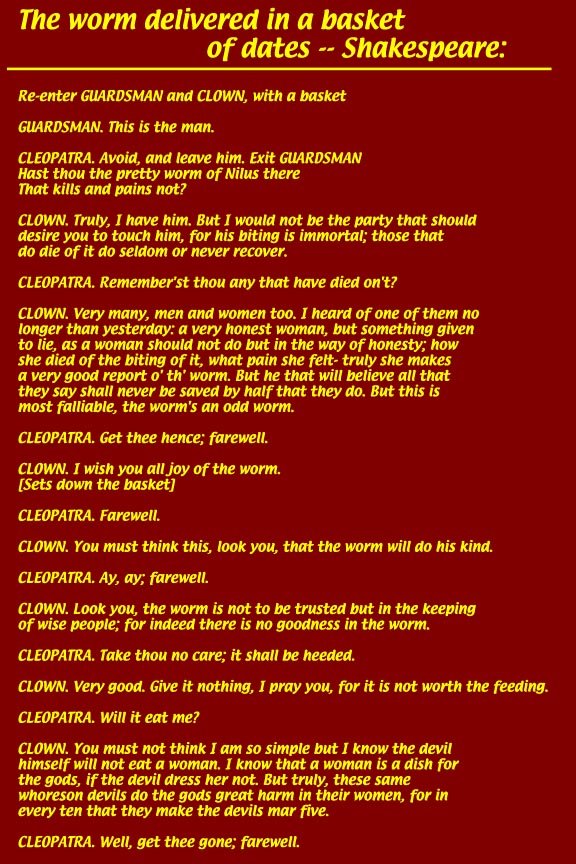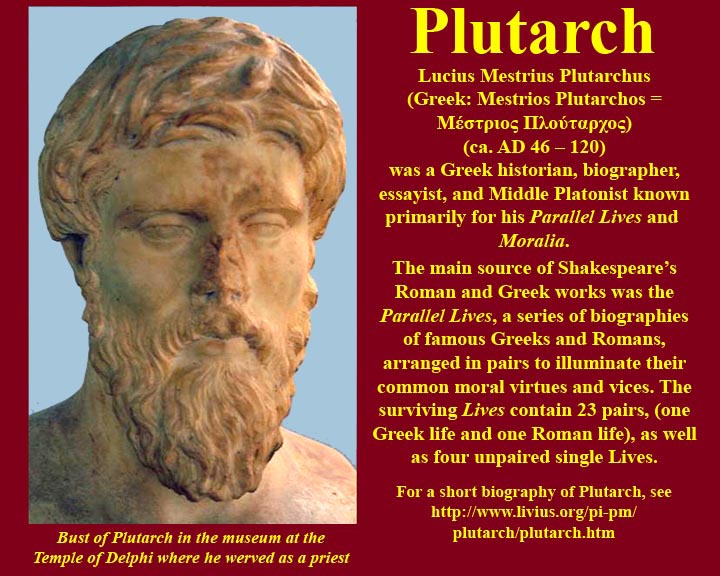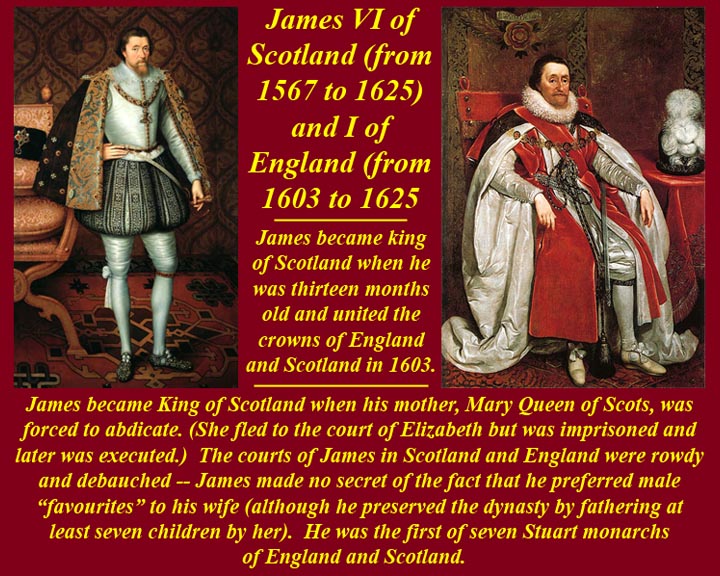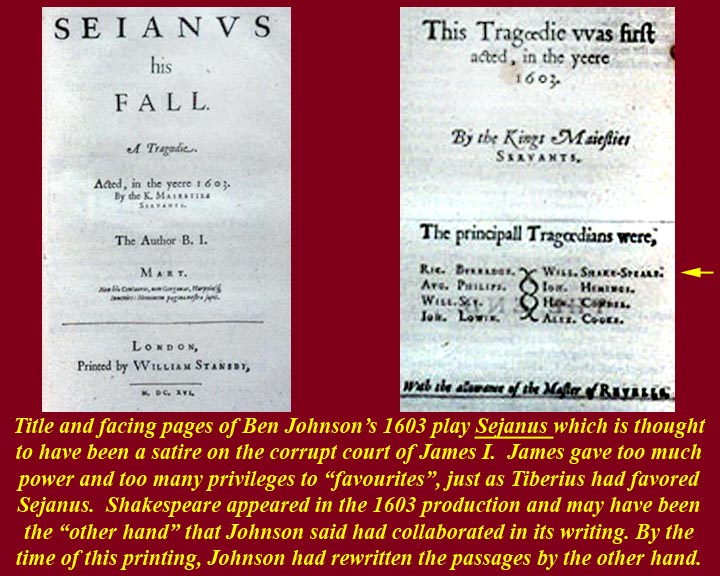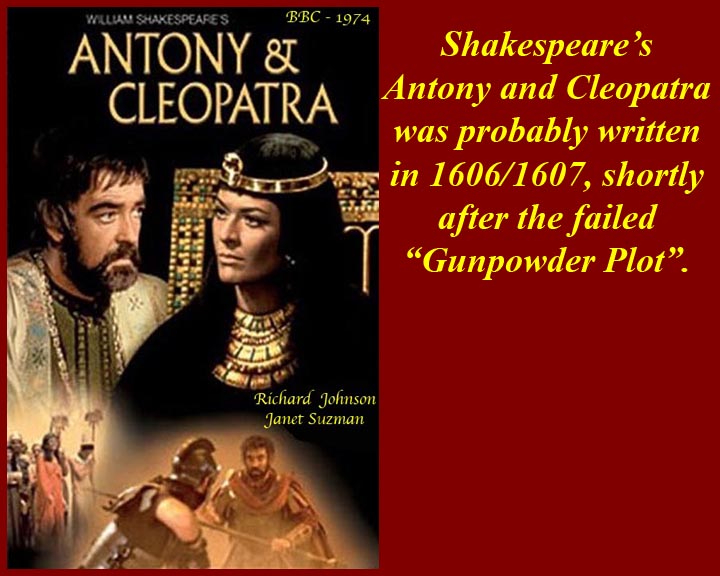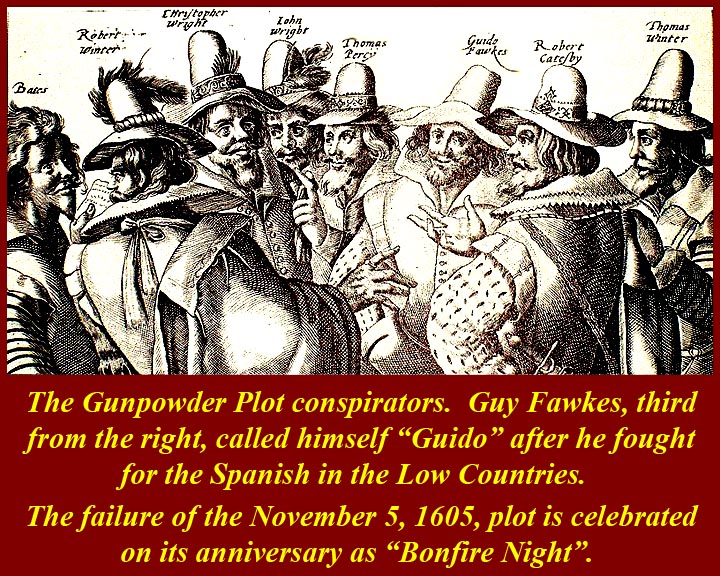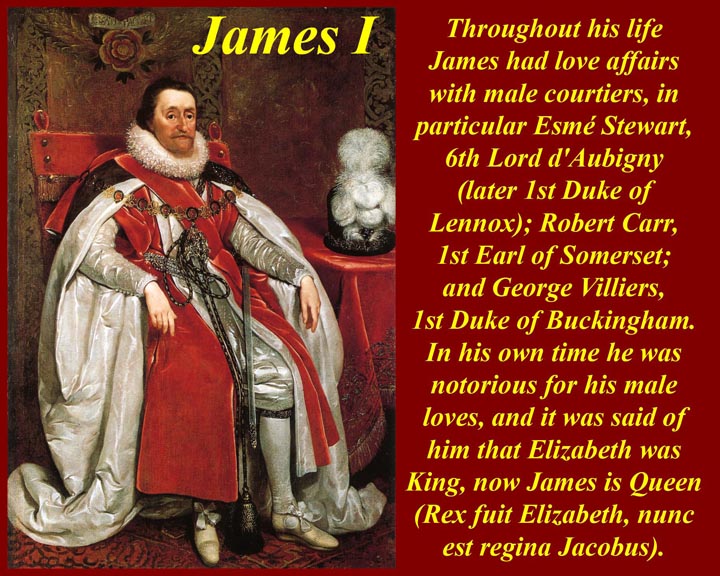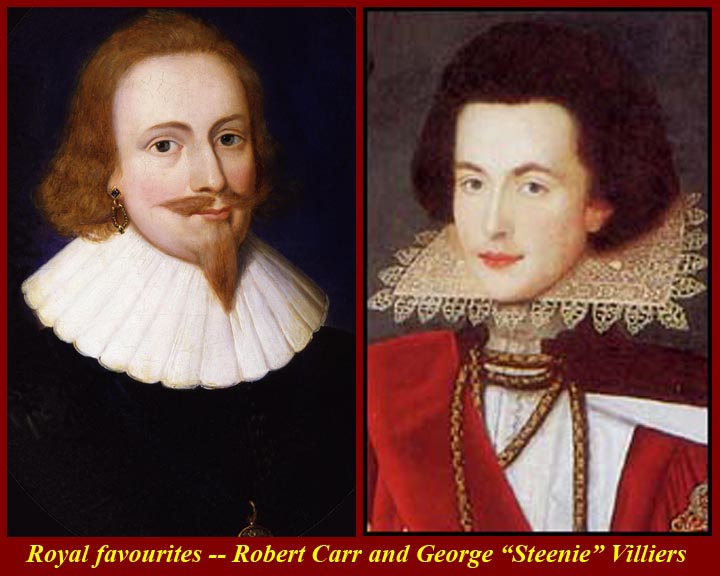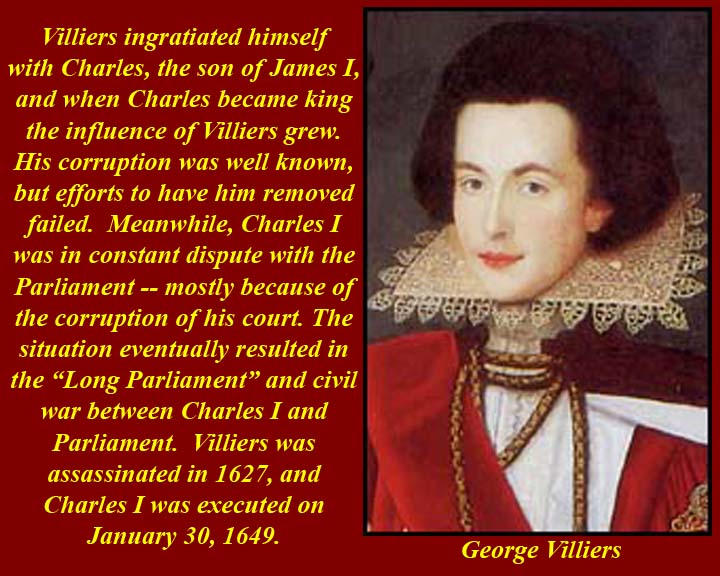Note that all dates are recalculated to the modern Gregorian calendar.
Shakespeare's Antony and Cleopatra

http:/www.mmdtkw.org/RomeShak200a-Shakespeare1.jpg
Antony and Cleopatra was apparently written in 1606/07. (Most scholars believe it was written in 1606–07, although some researchers argue for an earlier dating, around 1603–04.) Antony and Cleopatra was entered in the Stationers' Register (an early form of copyright for printed works) in May of 1608, but it does not seem to have been actually printed until the publication of the First Folio in 1623. The Folio is therefore the only authoritative text we have today. Some Shakespeare scholars speculate that it derives from Shakespeare's own draft, or "foul papers," since it contains minor errors in speech labels and stage directions that are thought to be characteristic of the author in the process of composition.
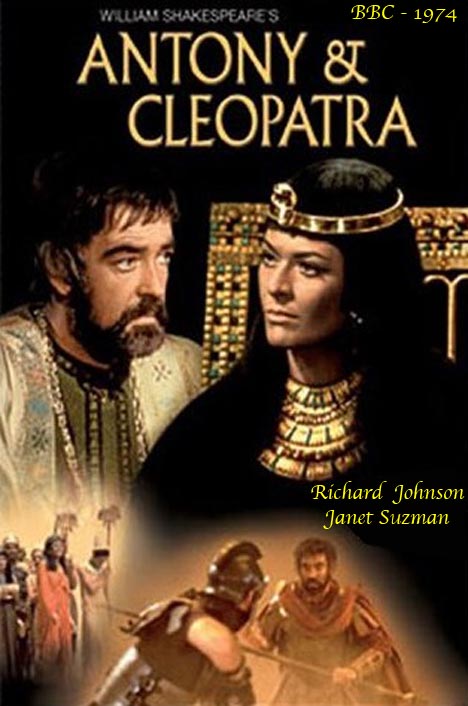
http://www.mmdtkw.org/RomeShak300-AntonyCleo.jpg
Our version of Antony & Cleopatra is a 1974 television production of Trevor Nunn's stage version performed by the Royal Shakespeare Company. This version was shown in the United States to great acclaim in 1975. It stars Janet Suzman (Cleopatra), Richard Johnson (Antony), and Patrick Stewart (Enobarbus).
The principal source for the story is Plutarch's "Life of Mark Antony" from Lives of the Noble Grecians and Romans Compared Together, in the translation made by Sir Thomas North in 1579. A large number of phrases within Shakespeare's play are taken directly from North's prose, including Enobarbus's famous description of Cleopatra's barge, beginning "The barge she sat in, like a burnished throne/Burned on the water." However, Shakespeare also adds scenes, including many of the ones portraying Cleopatra's domestic life, and the role of Enobarbus is greatly developed. Historical facts are also sometimes changed: in Plutarch Antony's final defeat was many weeks after the battle of Actium, and Octavia lived with Antony for several years and bore him two children.
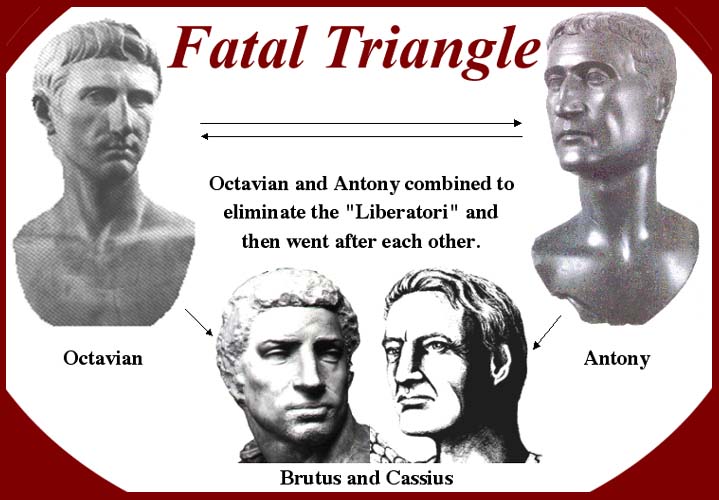
http://www.mmdtkw.org/RomeShak300a-ThreeWayCivilWar.jpg
The play opens shortly after Brutus and Cassius have been eliminated in the Battles of Philippi leaving only Antony and Octavian to dispute control of what will become the Roman Empire.
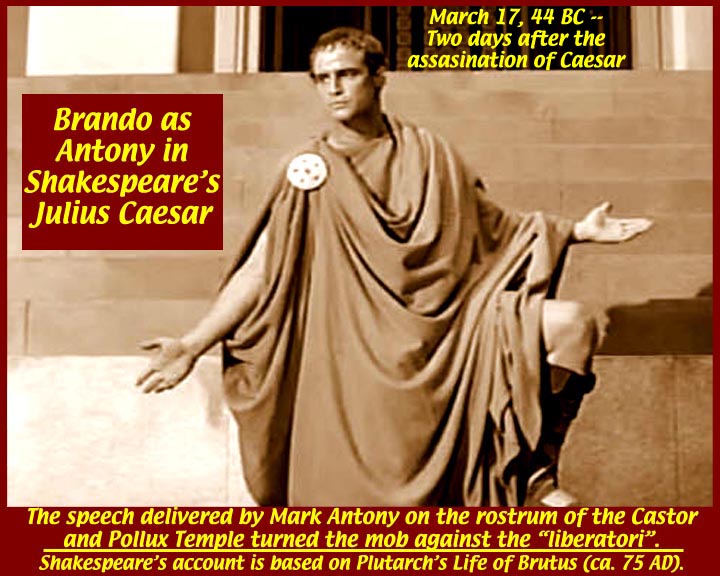
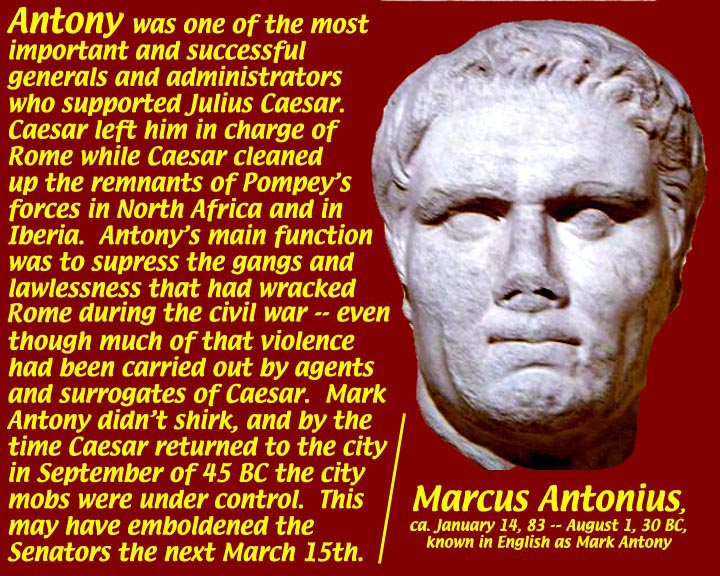
http://www.mmdtkw.org/RomeShak301-AntonySpeech.jpg
http://www.mmdtkw.org/RomeShak301a-MarkAntony.jpg
Antony's speech had turned the mob against Brutus and Cassius and the other "Liberatori". His reputation, according to Plutarch, wasn't very good -- at least by upper class standards. He drank, wenched, danced, hung out with "theater people"; he did everything to excess. Worst of all, he fraternized with his troopers. He was a man of action and military all the way.
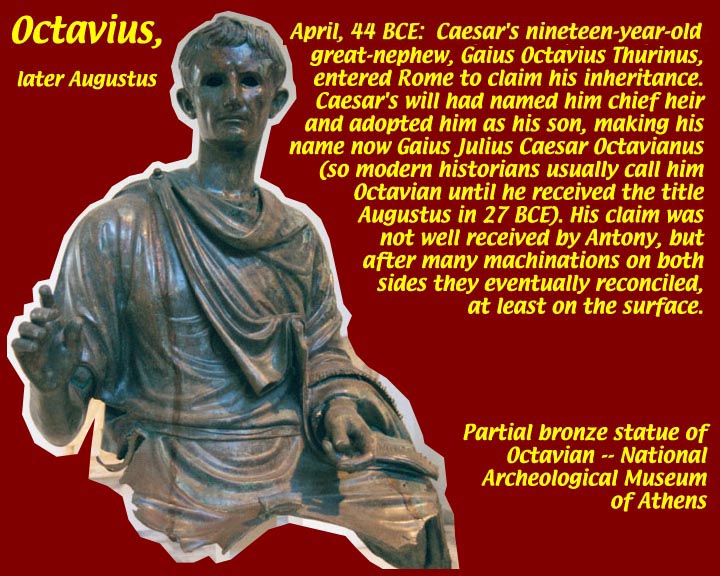
http://www.mmdtkw.org/RomeShak302-Octavian.jpg
Octavian had served as a Legatus (a staff officer) in Julius Caesar's mopping-up operation in Spain, but that was the extent of his military experience until he faced Brutus at Philippi. Brutus was also no great military leader, but he still over-ran the even less experienced Octavian. Both battles at Philippi were actually won by Mark Antony. But in his later run-ins with Antony, Octavian had a secret weapon: his good friend and military strategist (later his "minister of public works"), Marcus Agrippa (see below).
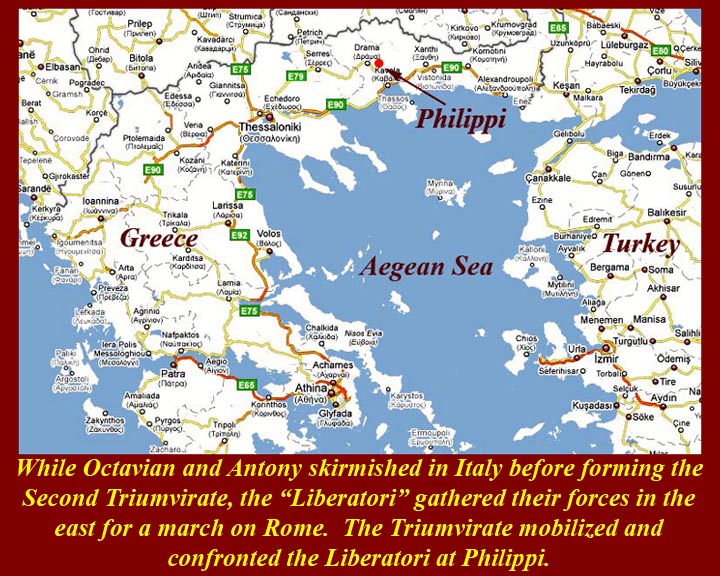
http://www.mmdtkw.org/RomeShak303-PhilippiLocatorMap.jpg
After the second battle at Philippi, Octavian went back to Rome to get things under control, and Mark Antony headed eastward with the intention of carrying out Julius Caesar's plan to conquer Parthia. Octavian reached his destination, but Antony was sidetracked.
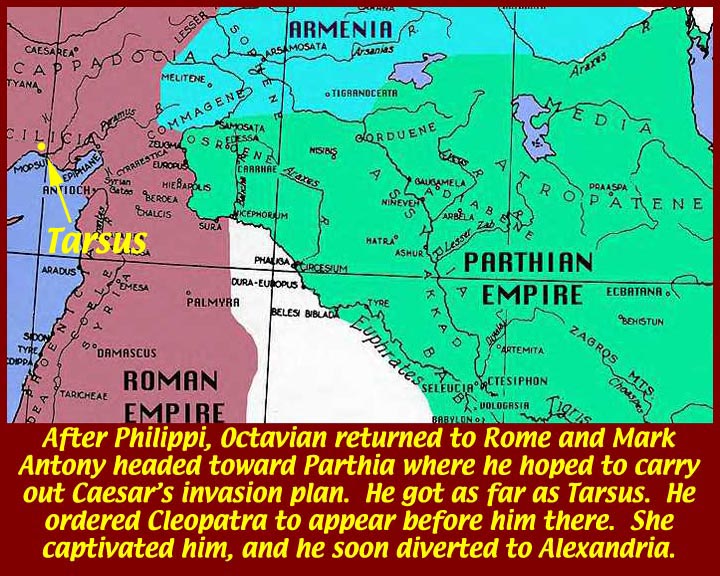
http://www.mmdtkw.org/RomeShak304-AntonyCleopatraTarsus.jpg
Antony got as far as Tarsus where he mustered his forces. To finance his expedition into Parthia, he demanded that Cleopatra should bring to him in Tarsus the funds that had been promised to Julius Caesar (i.e., to Rome) as a price for Roman support for her regime in Egypt. Cleopatra came to Tarsus in style.
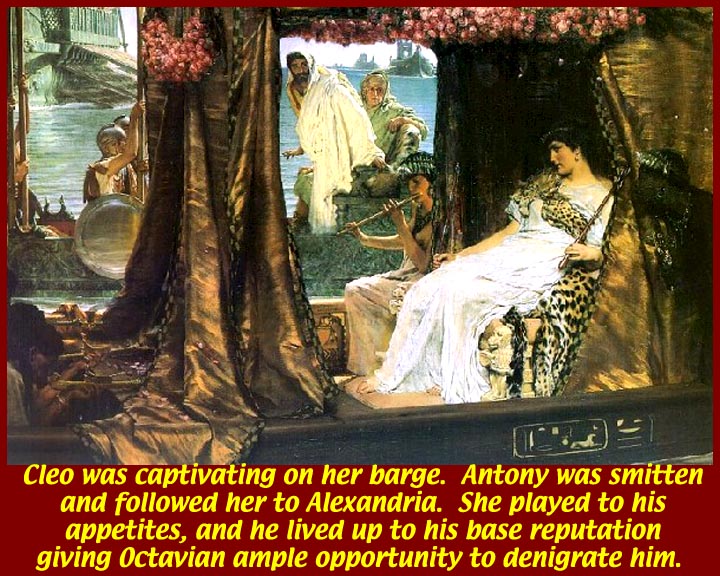
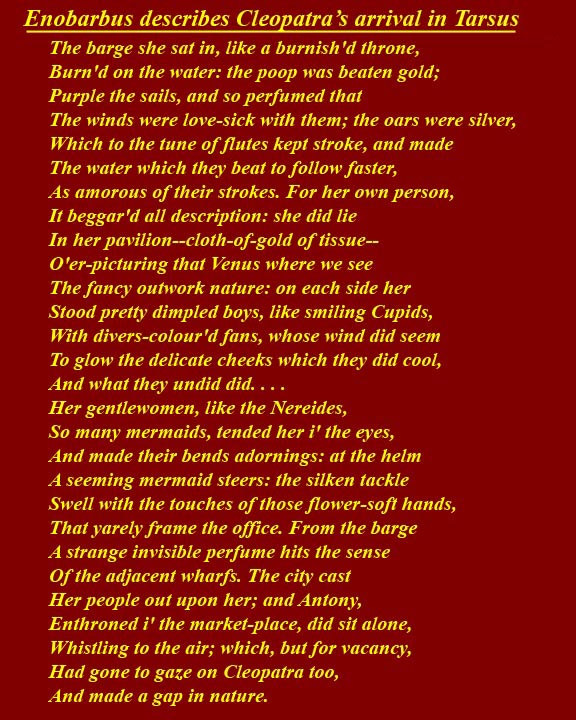
http://www.mmdtkw.org/RomeShak305-CleopatraBarged.jpg
http://www.mmdtkw.org/RomeShak306-EnobarbusDescribesCleo.jpg
Shakespeare give his character Enobarbus the words of Plutarch's description (via the Thomas North translation) of the arrival of Cleopatra in Tarsus. Antony sent messengers to Cleo: she was to report to him in the central piazza. She refused to come and said Antony should come to her barge. He came to her, and together they departed for Alexandria. The Parthian campaign was deferred.
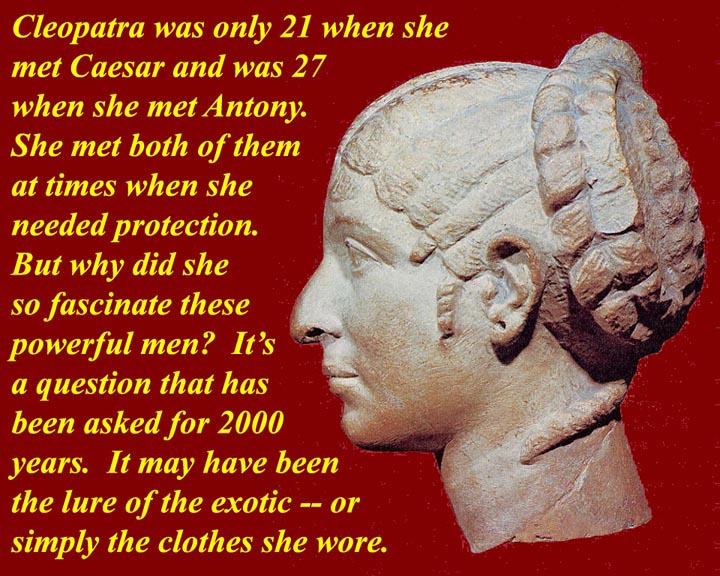
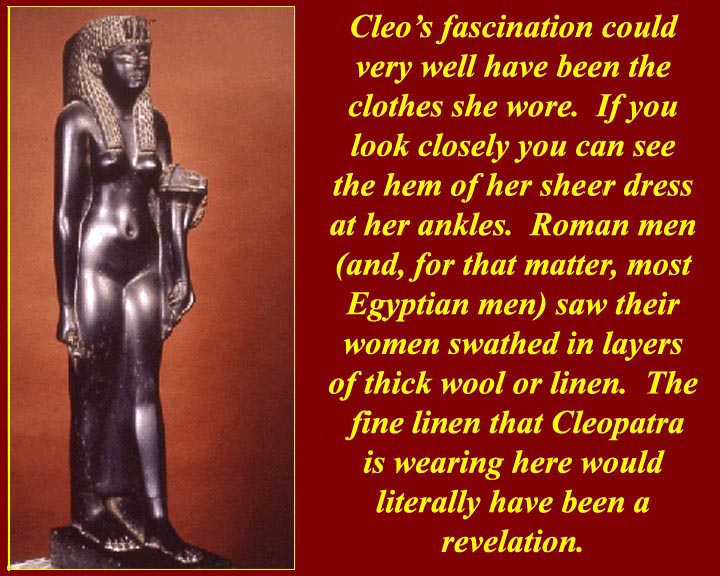
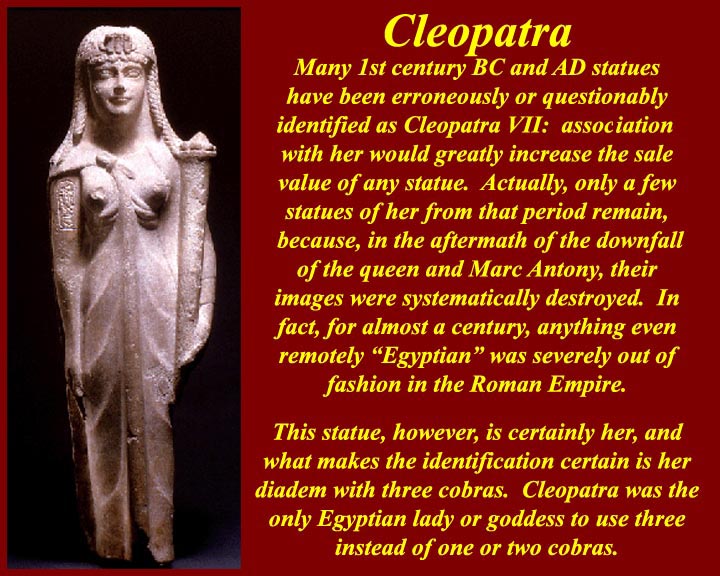
http://www.mmdtkw.org/RomeShak307-CleopatraProfile.jpg
http://www.mmdtkw.org/RomeShak308-CleopatraClothes.jpg
http://www.mmdtkw.org/RomeShak309-Cleopatra1.jpg
Cleo's appearance has been maligned by many modern commentators. They appear to have seen only her coins, which, because of the way they were made and because of the conventions of coin-die engraving then in use, made her nose look as if it it had a pronounced hook. She was no great beauty, but neither was she grotesque. And she did know how to dress like a queen. It should be noted that modern productions of Antony and Cleopatra, like productions since the day of Shakespeare, offer only prudish costuming in comparison to what ancient Egyptian court women really wore.
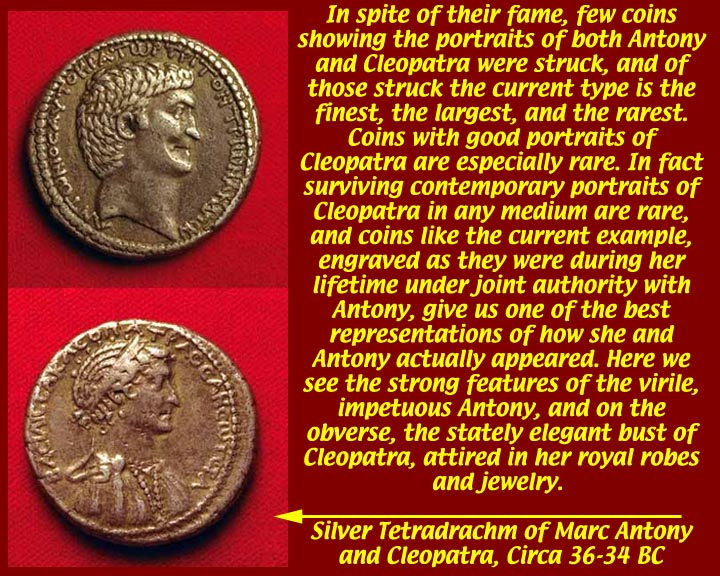
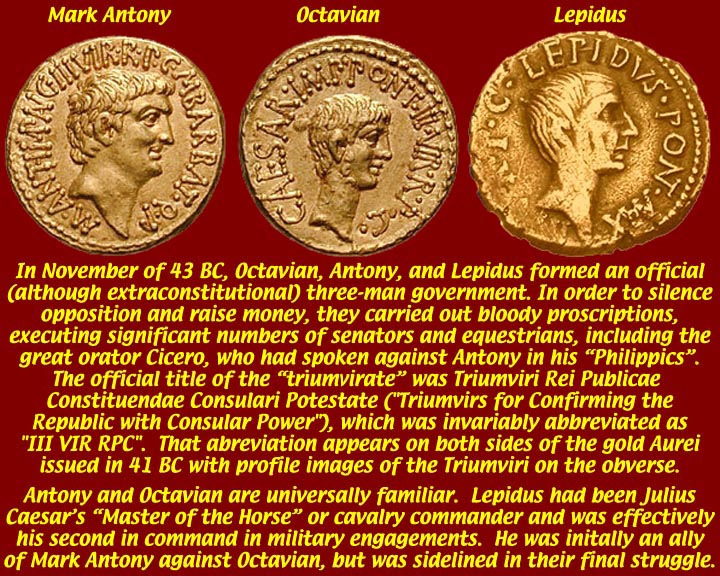
http://www.mmdtkw.org/RomeShak310AntonyCleopatra.jpg
http://www.mmdtkw.org/RomeShak311-VirRPC.jpg
Antony, as one of the three members of the Second Triumvirate (which unlike the First Triumvirate was an official alliance sanctioned by the Roman Senate) could issue coins carrying his image. The fact that he put Cleopatra on the reverse of some of his coins was considered scandalous.
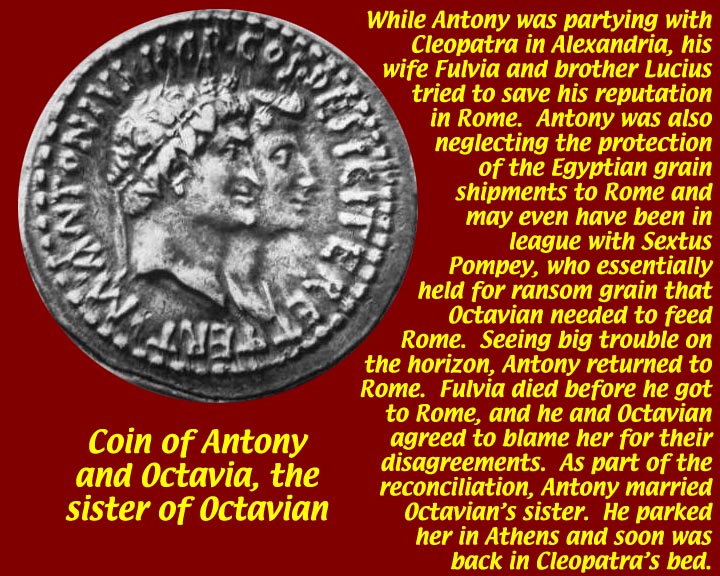
http://www.mmdtkw.org/RomeShak312-ReconcilAnthonyOctavia.jpg
Octavian and Antony quickly quarreled. Antony's behavior in Alexandria was outlandish (i.e., it literally was more fitting for an outlander -- an eastern potentate -- than for a staid Roman statesman) and therefore was outrageous to Octavian and the Senate. Antony had allies and supporters in Rome, but even they acknowledged that Antony's demeanor lacked dignitas and Romanitas. Everyone knew that Antony had "gone native" in Alexandria, had put off his Toga, and was walking like King Tut (http://www.youtube.com/watch?v=saZm6-6rZ88). A temporary alliance between Octavian and Antony was cobbled together when Octavian gave his sister, Octavia, to be Antony's wife (after the death of Fulvia). Fulvia was blamed for uprisings in Italy by allies of Antony and by Antony's brother Lucius. Together with Lucius Antonius, Mark Antony's brother, Fulvia had raised eight legions in Italy to fight for Antony's rights against Octavian. The Antonian army occupied Rome for a short time, but eventually it retreated to Perusia (modern Perugia). Octavian besieged Fulvia and Lucius Antonius in the winter of 41 BC-40 BC, starving them into surrender. Fulvia was exiled to Sicyon, where she died of a (convenient) sudden illness while Antony was en route to meet her. Her death opened a space for Octavian and Antony to reconcile. Now a widower, Antony married Octavian's second elder sister Octavia Minora. (For more on the remarkable Fulvia and her uprising, see http://en.wikipedia.org/wiki/Fulvia. For more in Octavia Minora and her role in the complex politic of her time, see http://www.livius.org/oa-om/octavia/octavia_minor.html.)
As part of Shakespeare's telescoping of the action in his Antony and Cleopatra, he makes it appear that Antony almost immediately abandoned Octavia Minora in Athens. In fact, Antony and Octavia lived together in Athens from 40-37, and she bore him two daughters, both named Antonia.
(a)
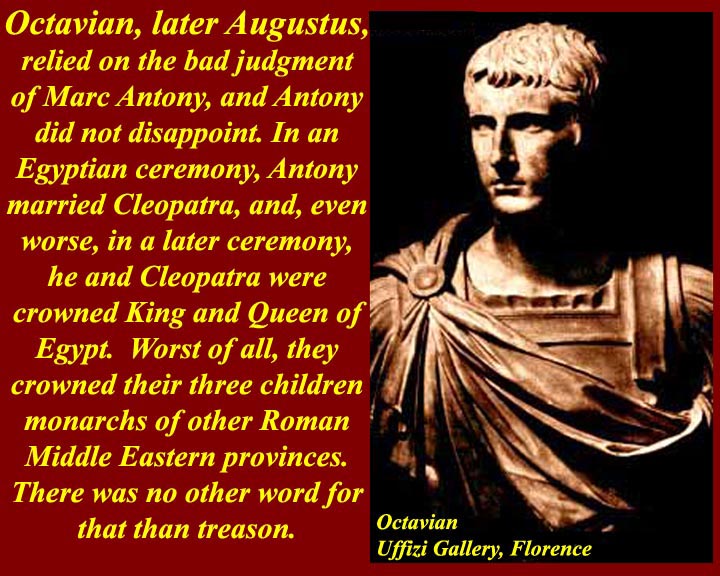 (b)
(b)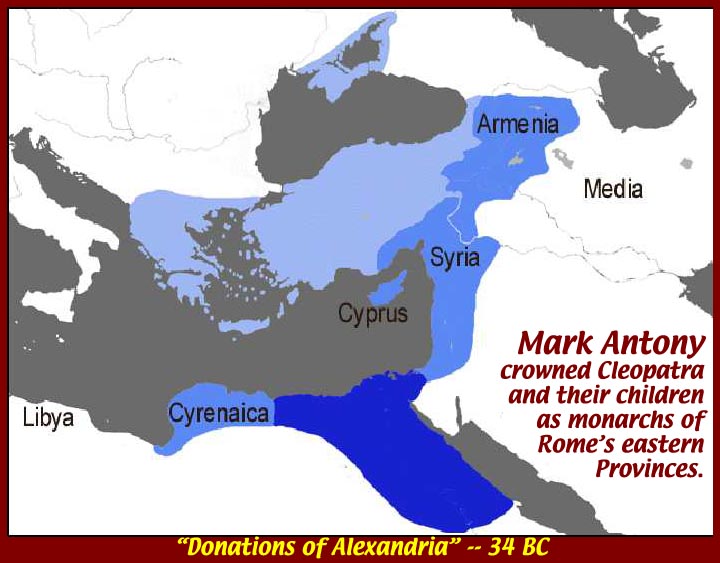 (c)
(c)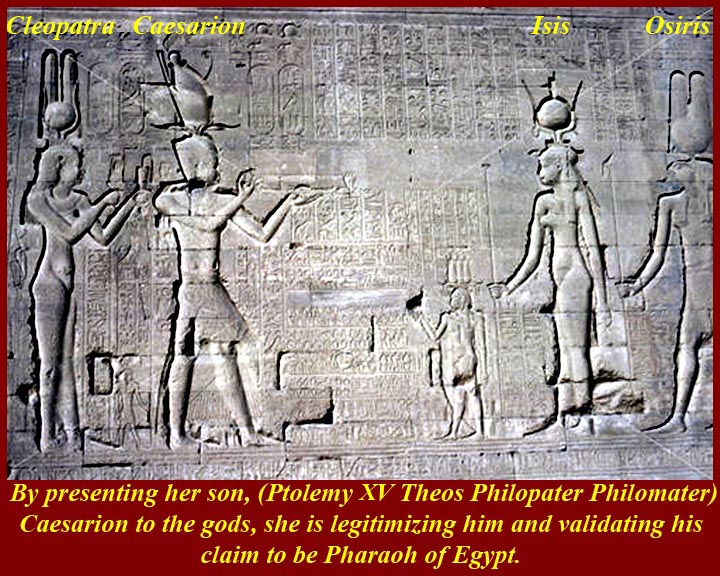
http://www.mmdtkw.org/RomeShak313-Octavian.jpg
http://www.mmdtkw.org/RomeShak314-DonationsAlexandria34BC.jpg
http://www.mmdtkw.org/RomeShak315-DenderaCaesarion.jpg
Some Roman historians have concluded that the marriage of Mark Antony to Octavia was a trap set by Octavian, who, they say, relied on Antony to act like Antony. Trap or not, Antony put aside his loyal Roman wife and took up again with Cleopatra. In short order, Antony married Cleopatra, legitimized their children together, recognized Caesarion as the son of Julius Caesar (and thus as a potential rival to Octavian, and -- worthy of the utmost of Roman opprobrium -- parceled out Roman territories to Cleopatra and her kids. The Senate outlawed Antony and allowed Octavian to wage war against "Egypt" (so as not to sanction a civil war). Image (b) above shows the territories that Antony alienated to Cleopatra and her children in the so called Donations of Alexandria. Image (c) shows a wall of the temple at Dendera: Cleopatra is presenting Caesarion to Isis and Osiris (and to others of the Egyptian pantheon, who are off the right edge of the image). Cleopatra had arranged the death of her younger brother Ptolemy XIV and had named Caesarion as Ptolemy XV Philopater Philometer Caesar, Caesarion (Πτολεμαῖος ΙΕʹ Φιλοπάτωρ Φιλομήτωρ Καῖσαρ, Καισαρίων = transliterated, Ptolemaĩos Philopátōr Philomḗtōr Kaĩsar, Kaisaríōn -- in some references "Theos" is added).
Caesarion was the illegitimate son of Cleopatra VII & Julius Caesar, born while Caesar was in Egypt to settle the civil war between Cleopatra & her brother (Ptolemy XIII). When Cleopatra brought Caesarion to Rome (46 BC) Caesar publicly acknowledged his paternity. After Julius Caesar's assassination, Caesarion returned to Alexandria & (at the age of 3) was officially installed as his mother's co-ruler. He had just reached puberty when his mother's lover (Mark Antony) rashly hailed him as "King of Kings." During the ensuing war between Antony & Octavian (31 BC), Caesarion was kept away from Alexandria. But after his mother's suicide, Octavian enticed him to return, only to have him executed, ending the Ptolemaic dynasty. Thus, contrary to what is commonly held, Caesarion and not his mother Cleopatra was the last pharaoh of the Ptolemaic Dynasty. Augustus and later Roman emperors also were styled as pharaohs -- a "Roman Dynasty" -- but they did not reside in Egypt.
For more on Caesarion, the boy pharaoh, see http://en.wikipedia.org/wiki/Caesarion. For more on the end of the Ptolemaic dynasty, see http://penelope.uchicago.edu/Thayer/E/Gazetteer/Places/Africa/Egypt/_Texts/BEVHOP/13*.html
but note that Bevan's numbering of the sequential Cleopatras is not that which is now commonly used -- Bevan's Cleopatra VI is now Cleopatra VII.
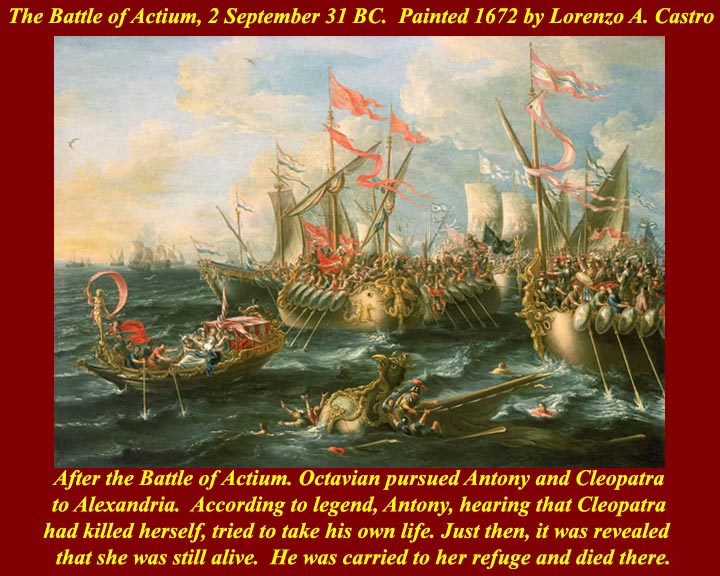
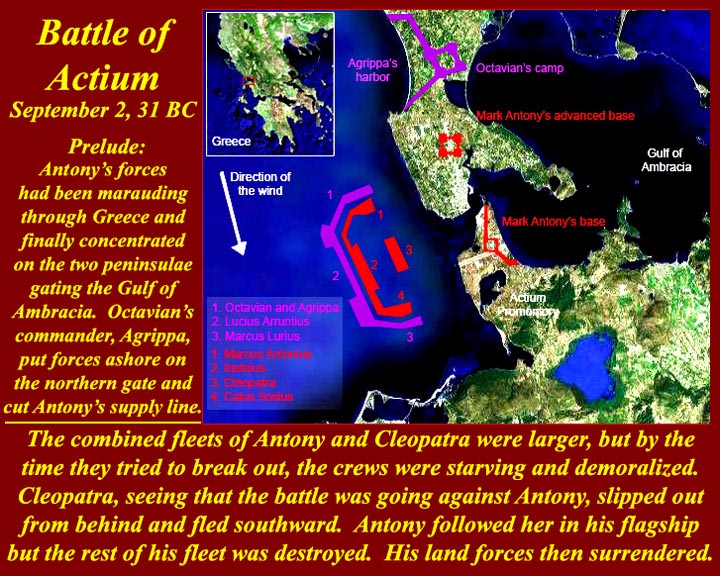
http://www.mmdtkw.org/RomeShak316-CastroBattleActium.jpg
http://www.mmdtkw.org/RomeShak317-BattleActium.jpg
Antony's big mistake was underestimating the speed with which Octavian's forces, led by Marcus Agrippa, would arrive in Greece. Agrippa put land forces ashore north of the Gulf of Ambracia, cut off Antony's supply line, and quickly expelled Antony's forces from the northern peninsula guarding the Gulf. Contrary to the Shakespearian scenario, it was starvation of Antony's land forces and losses of capable crews for his ships that decided Antony to make his desperate attempt to break through the naval blockade that Octavian (actually, Agrippa) had set up outside the mouth of the Gulf. Antony's and Cleopatra's fleets came out on September 2, 31 BC. Cleopatra's 60 lighter and faster ships were in the rear of Octavian's fleet, and, once the battle started, they slipped through the lines and fled southward. According to Plutarch, the besotted Antony got into a small boat and followed his True Love, who picked him up and took him off to Alexandria. The result of Antony's desertion of his fleet at Actium was a total loss of Antony's fleet and the surrender of his remaining legions.
Dio Cassius (Lucius Cassius Dio Cocceianus, writing in Greek some 200 years after the fact) raises the possibility that Antony and Cleopatra had pre-planned their escape with the idea of raising fresh forces in the east. In the event, Antony's and Cleopatra's eastern allies (the semi-subservient "kings") quickly declared for Octavian leaving Antony and Cleopatra with only a minuscule force and only the city of Alexandria as their geographic base. They resumed their debauched lifestyle (according to Roman historians) until despair led to their suicides.
(a)
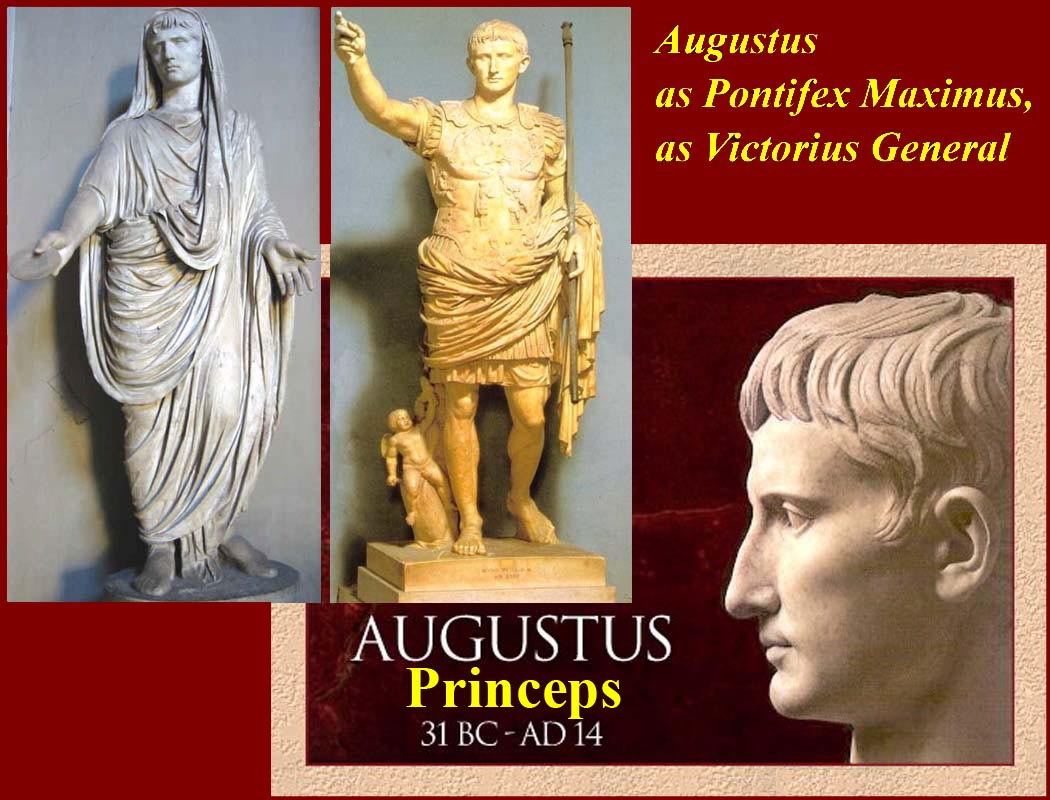 (b)
(b)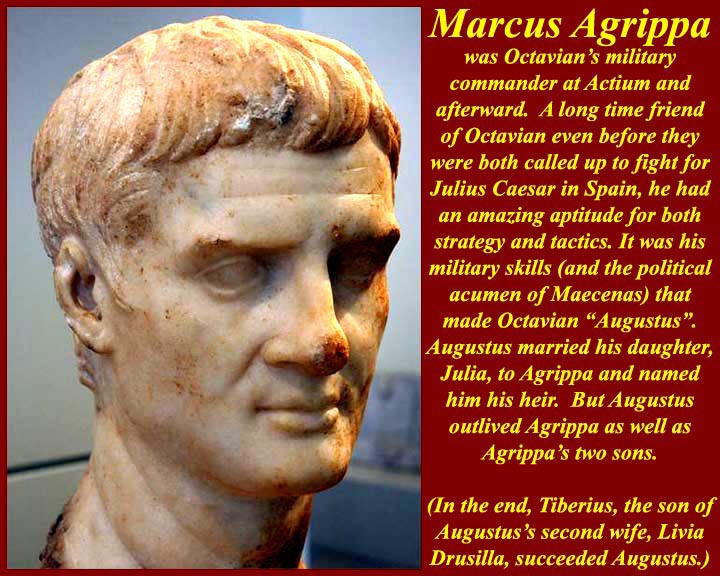 (c)
(c)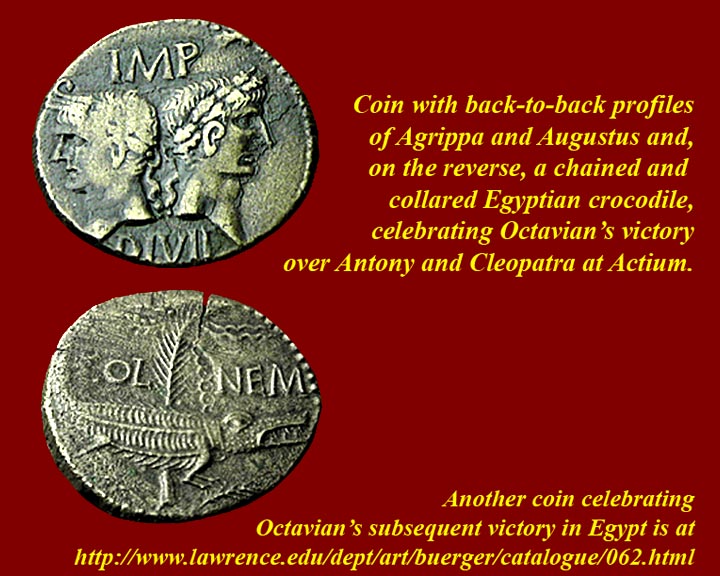
http://www.mmdtkw.org/RomeShak318-CaesarAugustus.jpg
http://www.mmdtkw.org/RomeShak319-Agrippa.jpg
http://www.mmdtkw.org/RomeShak319a-OctavianAgrippaCoin.jpg
In much later imagery (a), Octavian (Augustus) is shown as High Priest (succeeding Lepidus in 12 BC) and as conquering general. But the real victor in the campaign against Mark Antony and Cleopatra Was Octavian's friend and general/admiral, Marcus Vipsanius Agrippa (b). Many coins were issued to commemorate the victory over "Egypt" , and in the coin shown (c) Augustus acknowledges the important role of Agrippa.
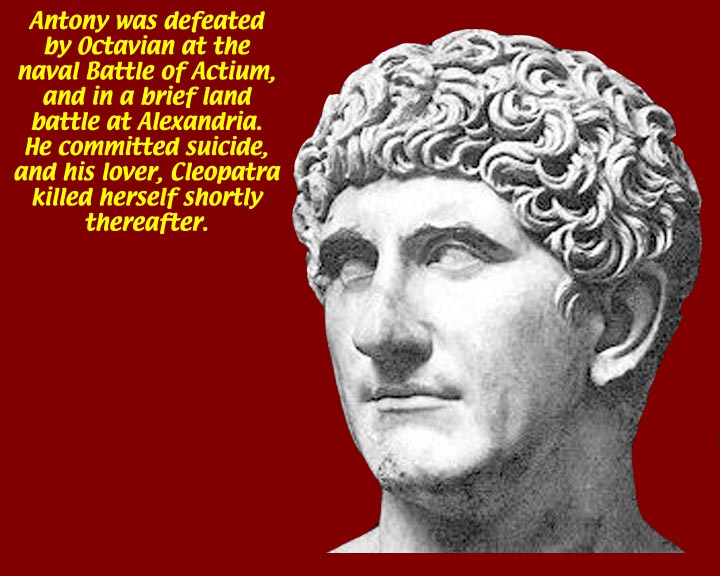
http://www.mmdtkw.org/RomeShak320-SuicideMarcusAntonius1.jpg
The story of Antony's suicide, in the mistaken belief that Cleopatra was already dead and after his final military defeat, comes directly from Plutarch's life of Antony. Shakespeare again telescopes the action. The final battle of Alexandria actually took place on August 1, 30 BC, eleven months after Actium (September 2, 31 BC). Antony's fleet and cavalry surrendered without a fight and his infantry was defeated. Cleopatra fled to her mausoleum and sealed herself and her treasure inside, accompanied only by her maidservants Iras and Charmion (and, according to Dio Cassius, a eunuch). A message then was sent to Antony that she had committed suicide, perhaps to prompt him to do the same (and so curry favor with Octavian). This he did, but the wound was not immediately fatal and, hearing that Cleopatra was alive, he was taken to her, being hoisted through an upper-story window and dying there in her chamber on August 10.
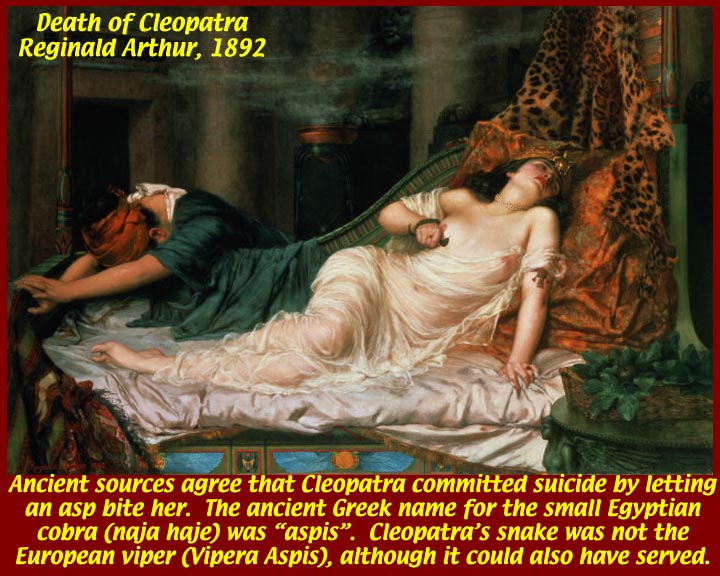
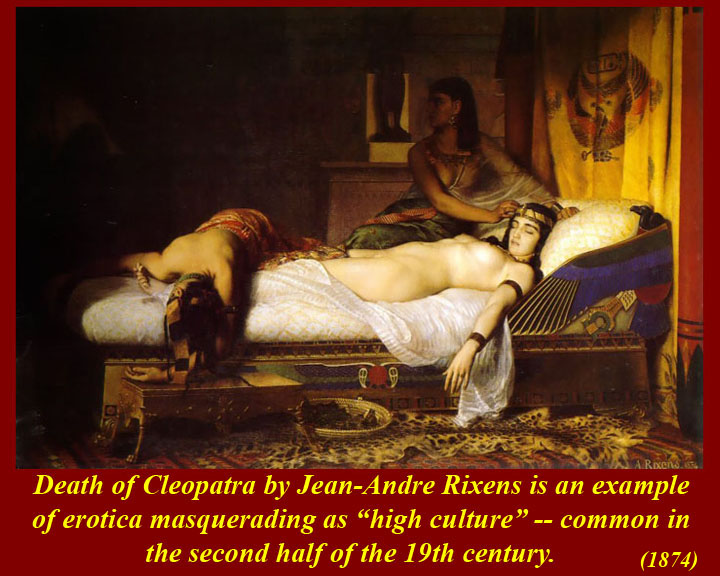
http://www.mmdtkw.org/RomeShak321-CleopatraAspArthur.jpg
http://www.mmdtkw.org/RomeShak322-1874, Rixens_Jean_Andre - The_Death_of_Cleopatra.jpg
"...Cleopatra
sent to Caesar a letter which she had written and sealed; and, putting
everybody out of the monument but her two women, she shut the doors.
Caesar, opening her letter, and finding pathetic prayers and entreaties
that she might be buried in the same tomb with Antony, soon guessed
what was doing. At first he was going himself in all haste, but,
changing his mind, he sent others to see. The thing had been quickly
done. The messengers came at full speed, and found the guards
apprehensive of nothing; but on opening the doors, they saw her
stone-dead, lying upon a bed of gold, set out in all her royal
ornaments. Iras, one of her women, lay dying at her feet, and Charmion,
just ready to fall, scarce able to hold up her head, was adjusting her
mistress's diadem. And when one that came in said angrily, 'Was this
well done of your lady, Charmion?' 'Extremely well,' she answered, 'and
as became the descendant of so many kings'; and as she said this, she
fell down dead by the bedside."
Plutarch, Life of Antony
(LXXXV.2-3, Dryden translation)
Cleopatra's death by the bite of an asp is an ancient tale. Although Cleopatra poisoned herself, no-one knew quite how. Dio says that the only marks on her body were slight pricks on the arm (LI.14.1). Some thought that they might be the bite of an asp, which had been hidden in a basket of figs or a water jar (although no snake was found), or a scratch to which poison was applied from a pin used to fasten her hair or hidden in a hollow comb. The bite of a snake would seem more likely (how else to account for the deaths of the two handmaidens) and was the version favored by Octavian. That, at least, is how Cleopatra was depicted in his triumphal procession, with an asp clinging to her image (Plutarch, LXXXVI.3; cf. Dio, LI.21.8, "an effigy of the dead Cleopatra upon a couch was carried by, so that in a way she, too,...was a part of the spectacle and a trophy in the procession").
It also is the version adhered to by the Augustan poets, who wrote within a decade after Actium. In the Aeneid, Virgil speaks of the queen not turning her head "to see twin snakes of death behind" (VIII.696-697). Horace (Odes, I.37, "Nunc est bibendum") and Propertius (Elegies, III.11.53-54) also speak of two snakes, not one, although the other primary source, Velleius Paterculus, does mention a single asp (II.87). Whether a rhetorical flourish, certainly it was an exotic death, befitting a queen of Egypt. If by the bite of a cobra, it would have been even more symbolic, as the snake was emblematic of the uraeus, the stylized image that Cleopatra would have worn on her pharaonic headdress, and sacred to the goddess Isis, of whom she felt herself to be the incarnation, the "New Isis" (Plutarch, Antony, LIV.6).
It is only the Greeks who posit an alternative explanation for the death of Cleopatra. Strabo is the earliest source for her suicide and even may have been in Alexandria at the time. (Plutarch wrote more than a century after the events he describes, Dio, a century later still, although his source probably was a history by Olympus, Cleopatra's personal physician, whom he mentions, LXXXII.2; also Plutarch, LXXXII.2.) He is of two minds: whether it was "by the bite of an asp or (for two accounts are given) by applying a poisonous ointment "(XVII.10). Galen, writing in the second century, says in De Theriaca ad Pisonem (CCXXXVII) that she broke the skin by deeply biting her own arm. Roman authors continued to insist that the death of the queen was by snake bite. Suetonius, a contemporary of Plutarch, indicates in his Life of Augustus that she died from the bite of an asp, the poison of which Octavian had tried to have sucked from the wound by the Psylli, snake charmers from North Africa famous for that ability (XVII.4). Florus, a younger contemporary, has Cleopatra, dressed in her finest raiment, apply two serpents (II.21.11).
Shakespeare, too, has the queen bitten by two snakes, once on the breast: "Dost thou not see my baby at my breast,/That sucks the nurse asleep?" (Antony and Cleopatra, V.ii.), a tradition in popular culture that has replaced her being bitten on the arm, assuming that she was bitten at all and by how many snakes.
"The truth of the matter no one knows" (Plutarch, LXXXVI.2).
Much of the information in this entry and in the previous entry on Anthony's suicide is from http://penelope.uchicago.edu/~grout/encyclopaedia_romana/miscellanea/cleopatra/cleopatra.html.

